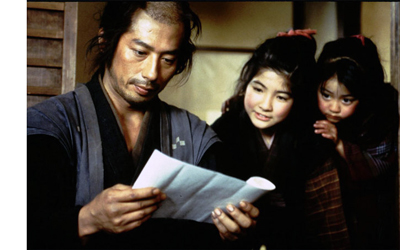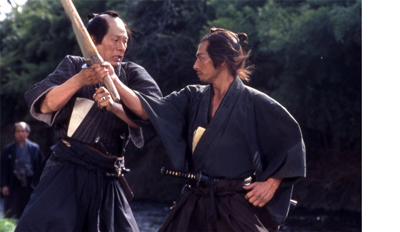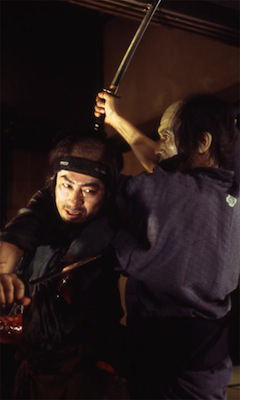
 |
|
|
|
Like American westerns, Japanese Samurai films have evolved in content and style. Fifty years ago Sergio Leone blended the two national genres and took the global box office by storm, with ultra-violent Italo westerns that in turn changed the tone of American and Japanese action cinema. I learned about Samurai films from odd directions. In Hawaii about 1960, the local TV stations showed some kind of Samurai show that looked like an American western -- the hero dressed in Japanese garb with a sword, but also wore a cowboy hat! At UCLA I was introduced to an ultra-violent Ogami Itto movie, which inspired a number of excursions to see more of the same at the Kokusai Theater on Crenshaw. Only later did I find out about the more traditional Samurai epics from the 1950s, before Kurosawa shook things up (and inspired Leone). One late '60s picture dealt more with court intrigues instead of sword duels, and so completely lost me with its proliferation of names and relationships. But then it revealed that its hero is being persecuted because he's a Christian. I thought that the 'samurai world' was a hermetically sealed domain of shoguns, daimyos, retainers, what have you. But the Portuguese visitors had to have some kind of influence beyond Tempura cooking. 
Like any genre, Samurai films continue to change. Director Yoji Yamada is well known from his theatrical Tora-San series about the day-to-day life of an average Japanese nice guy. In keeping with that brand of humanist drama, his 2002 The Twilight Samurai is a kinder and gentler swordsman tale with an emphasis on domestic issues. The hero is a reluctant veteran of the blade who just wants to raise his family in peace. But darn it, it's the 1860s and the social system is breaking up; soon there'll be civil war. What's a guy to do? Samurai Seibei Iguchi (Hiroyuki Sanada) is a lower-level retainer in a prominent clan, and works in an office keeping warehouse inventory records. Seibei's salary isn't enough to keep his family. His wife has passed away and he must work extra jobs and do piecework (like making insect cages) to feed and house his senile mother and two beloved daughters. Seibei has neither time nor money to take care of himself, and his torn clothing and poor hygiene bring him trouble at work. Than he comes in contact with Tomoe Iinuma, a childhood sweetheart now divorced. They're compatible and need one another, but Seibei but can't imagine marrying Tomoe because of his impoverished status. When Tomoe's loutish ex-husband Toyotarou Kouda (Ren Osugi) calls out Tomoe's brother Michinoju (Mitsuru Fukikoshi), Seibei accepts the challenge in his place. Word gets around that Seibei possesses hidden talents in combat, and his masters force him to accept the kind of deadly job he never wanted to do again. If he dies, what will happen to his family? Tora-san's problems were never this drastic. 
The well-made drama The Twilight Samurai has different aims than the violence - oriented genre pictures from the 1960s and '70s. To carry the American western analogy a bit further, it's not unlike a '50s domestic western like Anthony Mann's The Tin Star: although the hero is compelled to fight, the emphasis is on keeping the peace and Family Values. Seibei Iguchi doesn't know it but he's trying to join a Japanese Middle Class that hasn't yet been invented. He's basically a Gary Cooper version of the beloved Tora-San. He plays and interacts with his beloved girls as if he'd learned his parenting skills from Mister Rogers. Compared to Ogami Itto's outrageous "the ball or the knife" child-rearing philosophy, Seibei's home life is a Nipponese variation on Little House on the Prairie. We're accustomed to traditional Samurai pictures that emphasize the absolute rigidity of duty. 1 Old-fashioned retainers must sometimes abandon their loved ones to fulfill what are often contradictory clan obligations; the slightest show of weakness or hesitation can be an unpardonable offense against one's master. Many petty social rules are equally inviolable, without terrible consequences. Although the leading lady of Kinugasa's Gate of Hell suffers forever because a Samurai insists on pursuing a married woman, Seibei and Tomoe get away with un-chaperoned meetings. The key scene in The Twilight Samurai sees Seibei doing his best to duck out of an assignment to kill a man. With his lords and masters demanding that he agree, he instead gives excuses. He claims first that he'd rather decline the job, then that he's too out of shape to fight, and finally that he loves his children and doesn't want to leave them. It's like a middle manager resisting being told that he must fly to a conference in Cincinnati because he wants to attend his daughter's graduation. Seibei eventually has no choice but to give in. 
What's great about The Twilight Samurai is that this (anachronistic?) domestic angle heightens the impact of the violence -- we really care for Seibei. The film's thrills are not measured by a body count; it's almost like Father Knows Best must go out and fight for his life, hoping he will be able to return to his loved ones. The film's sword challenges are not shortchanged, however. Wanting to avoid bloodshed, Seibei handles one loutish challenger by opposing his sword with a stick of wood. But word of the conflict gets around, and soon a fancier swordsman is suggesting that they fight, just for curiosity's sake. The concluding battle finds the well trained but out of shape Seibei confronting a skilled sword master who has defied the whole system. This poor guy lost his family as well, and instead of obeying orders and killing himself, told his bosses to drop dead. Seibei is given the unenviable job of killing a man who is basically a version of himself but with even worse luck. P> Seibei's salary-man problems end up making him a modern identification figure. He must repay the debt for his wife's costly funeral, imposed by the demands of his position, and her relatives. Seibei loves Tomoe but can't imagine she's marry him because she's accustomed to living in a household with an income eight times higher than his. Seibei can't afford to be social or drink with the boys at work. When the Lord notices how badly he smells, Seibei embarrasses his boss.
The production values are fine throughout Yamada's movie, and the makeup in the final battle is terrific. Seibei's opponent has been holed up alone for days, and his face has a ghastly pallor. Star Hiroyuki Sanada has been a busy actor internationally as well as in Japan, taking roles of various sizes in The Woverine, 47 Ronin and Sunshine. The movie is told from the viewpoint of one of Seibei's daughters, whose narration is heard off and on through the picture. At the end we see her as an elderly woman, honoring her now-dead father. She's played by Keiko Kishi, the legendary actress known to American audiences as the demon Yuki-Onna in Kwaidan and as a leading player in Sydney Pollack's The Yakuza. Also honoring an earlier era of Japanese filmmaking is Tetsuro Tanba as Seibei's troublesome uncle. Tanba is the star of dozens of Samurai and Yakuza films, as well as the James Bond opus You Only Live Twice. Director Yamada followed up The Twilight Samurai with 2004's The Hidden Blade and Love and Honour in 2006. The Twilight Time Blu-ray of The Twilight Samurai is a handsome encoding of this fairly recent Shochiku presentation. Colors in some scenes are subdued, and the opening scenes in particular seem purposely greyed. The film ends up with a pleasing color palette, however. 
TT supplies their anticipated Isolated Score Track; the composer is Isao Tomita, the artist who put together the interesting synthesized album of Holst's The Planets back in the middle '70s. Walter Murch seems to have sampled or emulated a measure or two from that album for the beginning of the helicopter attack in Apocalypse Now; in this film we hear dialogue very similar to that in the Coppola movie, when Seibei is derided as a messenger boy delivering a bill. Or so it seems to this viewer An earlier DVD release from Empire Pictures included some filmmaker interviews, but its transfer was an inferior flat-letterboxed job. Twilight includes a non-subtitled Twilight Samurai trailer in excellent condition, and a second coming attraction for another Japanese film. Julie Kirgo's liner notes extol the film's higher values and tell us more about Hiroyuki Sanada, a former martial arts star who also worked with the Royal Shakespeare Company.
On a scale of Excellent, Good, Fair, and Poor,
The Twilight Samurai Blu-ray rates:
Footnotes:
1. Traditional? I'm only talking about the few dozen Samurai films I've personally seen from the 1950s through the 1970s. I am not an expert on Japanese history, nor do I know to what degree the films accurately reflect history.

Reviews on the Savant main site have additional credits information and are often updated and annotated with reader input and graphics. T'was Ever Thus.
Review Staff | About DVD Talk | Newsletter Subscribe | Join DVD Talk Forum |
| ||||||||||||||||||